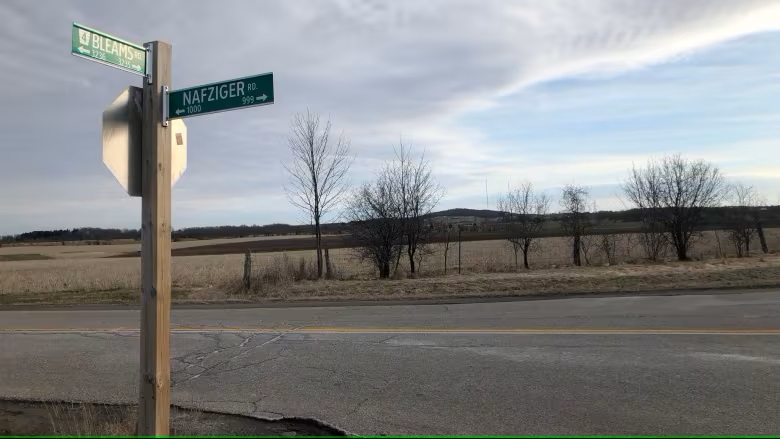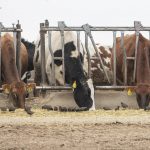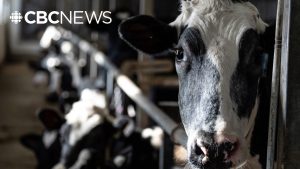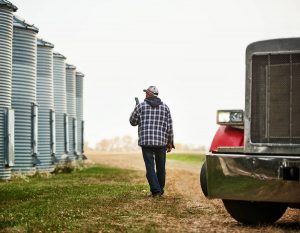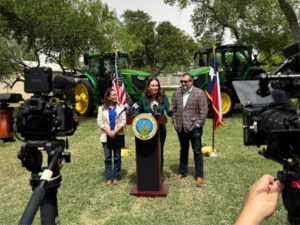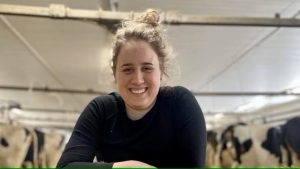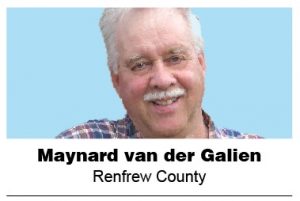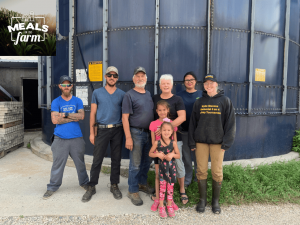
Region says lands are needed for future industrial development.
Some farmers in Wilmot Township say they feel like they’re being forced from their land after receiving notices on behalf of the Region of Waterloo asking them to sell their properties.
The affected landowners near the intersection of Nafziger Road and Bleams Road, south of New Hamburg. The region says the land is needed for future industrial projects.
Alfred Lowrick is a Wilmot Township resident and says his mother-in-law received one of the notices.
“I got a call from a neighbour who runs a dairy farm down the street and he said, ‘Have you heard this?’ and ‘A number of us want to get together to decide what we can do,'” Lowrick recalled.
Lowrick says there are roughly six significant landowners in the area being affected by the acquisition.
Landowners said they were visited by a representative from the private Mississauga-based company Canacre, which says on its website that it helps navigate complex infrastructure projects through the regulatory process. The person knocked on their doors to give them notice that the region wants to buy their properties.
The landowners received compensation offers, which Lowrick said many believe are minimal for what the land is worth. If the landowners refuse the offer, they were told their land will be expropriated.

‘This level of pressure … really not common’
Jennifer Pfenning, an organic farmer in Wilmot Township and president of the National Farmers Union, said she’s talked to farmers “from coast-to-coast” and this situation is ” it is something that I can’t find precedent for anywhere thus far.”
Pfenning’s farm is not located in the area where landowners are being asked to sell their properties to the region.
“Expropriation and this level of pressure being applied is really not common. I can’t think of another story or instance that I’ve heard of it.”
Pfenning says to her knowledge, expropriation should only be used for projects of significance to the community.
“For greater community good, not to serve the interest of a for-profit corporation. That is just an absolutely horrific abuse of power,” she said.
“Protecting farmland is something that’s very important to me and I think there aren’t enough people who recognize the importance of the farmland that we have and protecting what we have and how scarce it is,” she said.

In 2018, Pfenning was elected as councillor for Wilmot Township. She maintained that role until 2022.
She said during her time on council, it was common for certain subjects to be kept discreet or confidential, but she says she’s never seen anything like this.
“This is not about building a hospital or building some kind of infrastructure that is relevant to the community. I cannot fathom what would persuade members of council that this is something that’s appropriate to keep behind closed doors,” she said.
‘We weren’t really heard’
After receiving the notices and offers, Lowrick said community meetings were held to try and figure out what the farmers next steps should be.
He attended a regional council meeting to speak as a delegate on the situation.
“They gave me three minutes to speak and said, ‘We can’t talk about it because it’s confidential and if you need information, talk to this person,'” Lowrick said. “We were heard, I guess, but we weren’t really heard.”
Wilmot Township council meets Monday night. Some of the landowners asked to speak at that meeting, but were told would have to wait until a meeting in April to get on the agenda.
“The timeline is laughable,” Lowrick said. “They want to have all this done by August and there are offers that came in last week [on the March 20]. So we had no chance to even review this with council.”

He noted each landowner was offered a different compensation.
“One person indicated his family has farmed in this area since the mid 1800s and he’s one of the dairy farmers that’s affected on this property,” Lowrick explained. “That’s how you treat people? You can’t talk about it and walk away?”
Pfenning said she had heard some were being offered $35,000 an acre.
“That’s just not sufficient, that’s laughable,” Pfenning said, adding once the land is rezoned to industrial, it has potential to be worth over $1 million an acre.
Land needed to attract economic investments: Region
The Region of Waterloo issued a statement in response to questions from CBC News.
“The Region of Waterloo and Wilmot Township are partnering on land readiness to create shovel-ready sites to attract economic investments and create jobs,” the statement read.
“Land assemble is underway to create shovel-ready sites for large-scale economic investment to further support Waterloo Region’s economic vitality as is grows to one million residents by 2050.”
Wilmot Township officials did not respond to requests for comment from CBC News.
Despite rumours and speculation, there has been no confirmation of any specifics connected to the project.
The region’s official plan lays out how the municipality will use its land. It lists the lands at Bleams Road and Nafziger Road as being “prime agricultural area” but it falls outside lands designated as “protected countryside.”

When asked about this land and the official plan, the region said in an email that it along with the “province, area municipalities, local utility providers, and the Waterloo Region Economic Development Corporation will work to identify and plan for suitable ‘mega-sites’ to support new large-scale, strategic employment uses that complement the regional economy. Such sites typically range between 200 and 400 hectares in size and support large-scale manufacturing operations.”
Mark Reusser is vice president of the Waterloo Federation of Agriculture. He is also a farmer in Wilmot Township but his land is not affected by the acquisition.
“We have always been very careful with our official plans here in Waterloo region planning, for the fact that this is one of the most dynamic areas in all of Canada in terms of growth and innovation,” Reusser said.
“There’s always a tug and pull trying to balance the needs of those two urban and rural things … To see this happen without consultation and without transparency is a significant change from the past.”
Reusser said the region has seen farmland lost as part of plans for development.
“We’re concerned that it adds up. According to some of our calculations, if this continues and we continue to lose farmland to urbanization, aggregate extraction, green energy and battery storage, we will have no farmland left in southern Ontario in 50 years,” he said.
Lowrick says the farmers will continue to explore their rights and advocate for their land.
“We’ve been very active and very aggressive in looking at other similar situations,” he said, noting they’ve talked to lawyers. “We have banded together as landowners and as other groups of affected parties in and around it.”
You can now read the most important #news on #eDairyNews #Whatsapp channels!!!
🇺🇸 eDairy News INGLÊS: https://whatsapp.com/channel/0029VaKsjzGDTkJyIN6hcP1K
